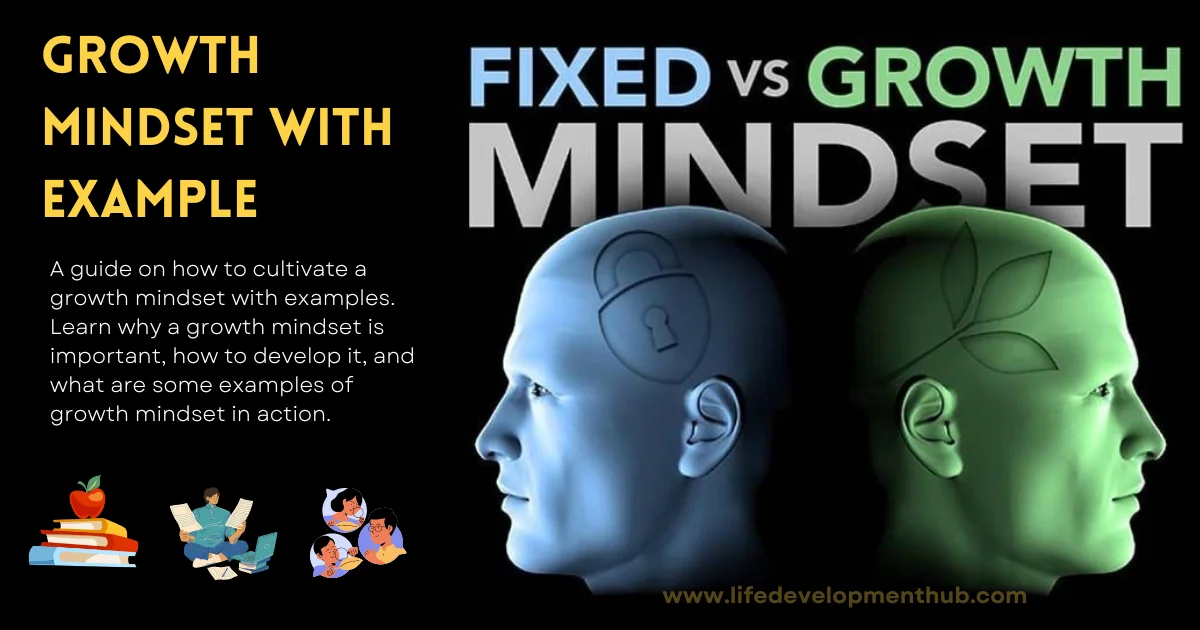A guide on how to cultivate a growth mindset with examples. Learn why a growth mindset is important, how to develop it, and what are some examples of growth mindset in action.
Are you seeking to enhance your skills, abilities, and achievements in life? Do you wish to discover how to effectively overcome challenges, accept feedback, and take pleasure from learning? If that is the case for you then developing a growth mindset may be the solution.
According to Stanford psychologist Carol Dweck and colleagues, a growth mindset can be defined as the belief that one’s capacities and talents can be developed over time. This stands in stark contrast with fixed mindset, in which individuals perceive their capacities and talents as fixed traits unchangeable over time.
We will explore why and how a growth mindset is important, how to implement one, and examples of growth mindset at work.
Why does having a growth mindset matter?
A growth mindset is essential to reaching your full potential in life. According to Dweck’s research, those with such a mindset tend to:
Have higher levels of motivation, perseverance and resilience Seek out challenges and opportunities for learning
View feedback and criticism as sources of improvement
Recognize their errors and failures
mes mes mes Collaborate and cooperate with others.
Enjoy the process of learning and development
People with fixed mindsets tend to:
– Reported lower motivation, perseverance, and resilience levels
– Avoid challenges and learning opportunities
mes – Seek to avoid challenges and learning opportunities Accept feedback as threats to their self-esteem, deny or blame their mistakes or failures Its, they compete or isolate themselves from others (Wikipedia, Stats).
Focus on outcomes and results
As shown, having a growth mindset can help you develop a positive perspective towards yourself, others, and life in general. Furthermore, it can aid you in reaching your goals faster and easier.
How can one cultivate a growth mindset?
Development of a growth mindset may seem difficult, but it is certainly achievable. Here are some steps you can take to foster it:
Recognize Your Fixed Mindset Triggers. Look out for situations or events that cause you to feel insecure, defensive, or powerless – these could be signs that your operating from a fixed mindset.
When your thoughts become fixed and unhelpful – “I can’t do this”, “I can’t learn this” or “This is too hard”, question them and replace them with more constructive ideas like: “I can learn this”, “I can improve this”, or “This is an opportunity”.
Adopt a language of growth. Make use of words and phrases that reflect growth mindset, such as “yet”, “and”, “what if”, and “how can I” in place of saying, for instance: “I can’t do that” or “This is too hard”. Instead of saying, “This is hard and I cannot do it”, say: “This is hard but I am confident I can manage”.
Celebrate Your Success And Progress – Take time to recognize and recognize the efforts and progress made over time, rather than focus on outcomes or results. Appreciate any steps forward regardless of size; reward yourself for trying new things, meeting challenges head on, learning from feedback.
– Seek feedback and learning opportunities. Don’t be afraid to reach out for help or advice from those with more experience than yourself, nor take feedback or criticism personally but rather as opportunities for improvement. Embark upon any challenges or difficulties as a chance for growth!
What are some examples of growth mindset?
Here are a few examples of growth mindset at work in practice: [[2][2] [3][3] [4][4] [5][5]
– Students who find math challenging should not give up or view themselves as incapable; rather they seek additional assistance from their teacher and study harder and practice problems more regularly in order to learn from mistakes they’ve made and grow from them.
– When receiving negative feedback on her writing, an author doesn’t become discouraged or defensive; they thank the reviewers for their comments, analyze any suggestions made, revise their work accordingly, and develop their skills as writers.
An athlete who loses a game shouldn’t feel ashamed or angry; instead, they congratulate the winner, reflect upon their performance, identify strengths and weaknesses as well as areas for improvement, then work to increase those areas for growth.
Managers facing complex problems shouldn’t feel helpless or overwhelmed when confronted by a challenging issue; rather, they break it into smaller components, research possible solutions, experiment with various approaches and learn from their results.
A musician attempting to master a new instrument doesn’t feel intimidated or frustrated when starting out; they set realistic goals for themselves, practice regularly, seek feedback from others, and enjoy the process of learning.
Conclusion
A growth mindset is the belief that one’s capacities and talents can be enhanced over time, which can increase motivation, perseverance, resilience, learning ability, collaboration and happiness in life. You can develop one by becoming aware of any fixed mindset triggers you encounter as well as challenging their thoughts with growth mindset-related questions, adopting growth mindset language when celebrating progress made or seeking feedback/learning opportunities – or by studying examples of growth mindset in action from other people’s lives to apply to yourself.

